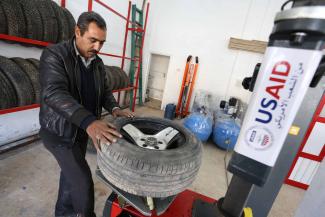<p>August 2016—Potholes and rough roads can take their toll on cars and trucks, especially when they are used multiple times a day. Abdullah Sharari has worked in the tire maintenance industry for over 30 years and knows the industry like the back of his hand.</p>
<p>Sharari noticed there was growing demand for a tire-changing service in a specific area of the bustling industrial city of Irbid, where the daily commute to work caused serious damage to vehicles.</p>
<p>Lacking the necessary capital to establish a second venture, but armed with vision and a smart business idea, Sharari applied for a $21,000 (15,000 JOD) grant from the USAID Jordan <a href="http://www.jordanlens.org/">Local Enterprise Support Project</a> targeted toward supporting new small business ideas.</p>
<p>Sharari’s second business opened in early 2016 and quickly became a regular stop for vehicles in need of tire maintenance. He now employs four full-time employees from the local community. As his business grows, Sharari envisions more opportunities for youth employment and training.</p>
<p>The growth of the small business sector is essential to Jordan’s economic development. With job creation and increased competitiveness, Sharari is providing a quality service that will holistically impact his community.</p>
<p>“My job is everything. I have been in the field long enough to know that I should seize a good business opportunity when I see one,” said Sharari. “I have no doubt that my shop will be of great value to the area and will benefit unemployed youth. I fully train and take good care of every single one of my workers to ensure they have all the necessary skills that will allow them to grow and excel in the field.”</p>
<p>Sharari is one of 54 grantees who have established or expanded their businesses with support from the Local Enterprise Support Project, a five-year, $69 million project that began in December 2013. The project aims to boost long-term economic growth in Jordan’s underserved communities by supporting micro and small enterprises like Sharari’s.</p>
<p><strong>LINKS</strong></p>
<div class="wysiwyg-style-related-link"><a href="https://www.usaid.gov/jordan">USAID’s mission in Jordan</a></div>
<div class="wysiwyg-style-related-link"><a href="https://www.usaid.gov/news-information/frontlines/may-june-2016/how-jor… Jordan Makes Local Governments Work in the Midst of the World’s Largest Refugee Crisis</a></div>
<p>Follow <a href="https://twitter.com/USAIDJordan?ref_src=twsrc%5Egoogle%7Ctwcamp%5Eserp%…;, on <a href="https://www.facebook.com/USAIDJordan"><strong>Facebook</strong></a>, on <a href="https://www.flickr.com/photos/usaidjordan/"><strong>Flickr</strong></a&…;, on <a href="https://www.youtube.com/user/USAIDJordan"><strong>YouTube</strong></a><…;
,“I have no doubt that my shop will be of great value to the area and will benefit unemployed youth.”

Mohammad Maghayda for USAID
